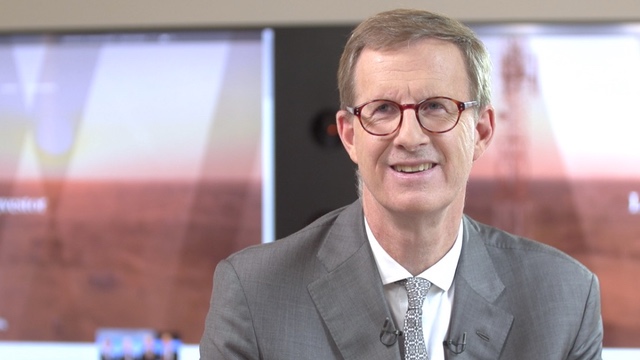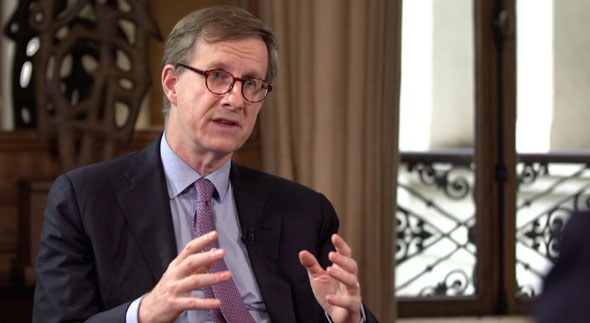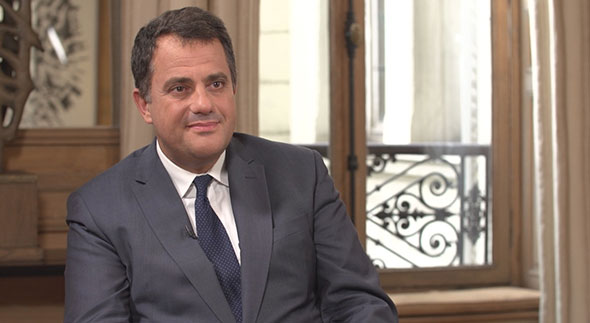EuroBusinessMedia (EBM): Wendel Investissment, one of Europe's largest listed private equity firms just reported full-year profit for 2006, Jean-Bernard Lafonta welcome.
Jean-Bernard Lafonta (JBL): Thank you.
EBM: You are the CEO of Wendel Investissement. Briefly, how would you describe your 2006 results, and what is your update on the performance in each of your most important positions: Bureau Veritas, Legrand, Editis, Materis and Deutsch?
JBL: I would say that 2006 was quite as good a year as the previous years. We had a growth in net earnings, what we call the recurring net earnings of our businesses, of + 23% year-on-year. And all our subsidiaries -- Bureau Veritas, Legrand, Editis and the other ones -- had good growth in organic terms, and a very good performance in terms of margin, so we had all those companies contributing to this performance.
EBM: Before getting into the detail of each company, a few questions about Wendel as a whole. We note that you choose to leverage not only the acquired companies but also your holding structure, which is rather unique to Wendel in this business. For investors listening today, how would describe yourself compared to other publicly-traded private equity firms, many of whom are anglo-saxon players?
JBL: I think that having access to the bond market for Wendel is something, as you say rather unique, but also which has a lot of value for our shareholders. I think that having access to money which is rather cheap, over ten years' time, creates a lot of additional value for our shareholders. On top of that, from a strategic point of view, we think that the main difficulty for holding companies, or investment companies, is to take the decision to sell a business without knowing what you will do with the money. And when you have a structural net debt in your balance sheet, you don't raise that question, and then you completely disconnect the decision of sale from the decision of acquisition. I think from a strategic point of view this is key in our business model.
EBM: You're often perceived as a very Franco-french company, mainly doing deals in France, despite the fact that your companies have international businesses. Do you have any ambition to make Wendel Investissement a truly global player in the near future?
JBL: I think we have all the time. What we look for is to increase the reservoir of opportunities we can access. What we saw in 2006, when we made three acquisitions outside of France - in the US with Deutsch, in the Nertherlands with AVR and Stahl - we saw the business model we have, which is long-term, rather industrial in terms of focusing on the development of the companies in which we are invested, is very powerful and is able to attract companies in our group with very strong competitive advantages, I mean without overpaying the acquisition you make. So we think we have the ability go abroad and become global, but it will take a lot of years, and we have absolutely no pressure to go quickly.
EBM: Do you see yourself starting to take minority stakes in publicly traded companies?
JBL: We don't make any difference about what is the liquidity or not of the capital of the company we buy. To give you an example: we are in Legrand, where we have 30% of the capital, and we don't think that Legrand in the public market has less potential than when we were previously the owner of Legrand as a private company. The potential of development of Legrand is exactly the same. So we don't care whether the company is public or not, we just care about what is the potential for development of that company, and whether Wendel useful for that development or not as a shareholder?
EBM: Where do you see yourself in terms of size in the next four to five years?
JBL: We have the ambition of doubling the size of Wendel in the next five years. This is less than what we did in the last five years, but we think that the environment could be also tougher than it was, so we think it's a reasonable ambition.
EBM: What is your acquisition strategy today: what are the profiles of your targets, where are they located geographically, and how big are they? Perhaps you could also bring us up to date about your financial firepower today to make new acquisitions?
JBL: We have approximately one billion euros available at any moment to invest into equity in new acquisitions. So we have, I would say, a fire power which is quite intact, despite the important number of acquisitions we have made in the last twelve months. We are very disciplined about acquisitions, so we don't care about not making an acquisition one given year. We are really looking at companies that have a very strong profile in terms of development potential and where Wendel can increase that development potential. So, to give you an example, when we looked at Deutsch in the US, we felt that this group of companies could become a very powerful leader in high performance connectors and that it could be done over the next ten years. And because of that, Wendel had, as a shareholder, a very strong competitive advantage over any other kind of shareholders.
EBM: Are you concerned about the rising level of leverage at LBO firms in general and rising prices, resulting in a fiercer competition for assets and a correlative decrease in expected ROI?
JBL: We have, I would say, a concern about that, because we feel that the price of some assets where you can put a lot of debt has increased significantly over the past three or four years. And that because of that the risk of interest rate you bear when you make certain acquisitions is high. So we don't look at that kind of acquisition. For example we didn't look in France at the sale of Saur, or the sale of TDF, or the sale Yellow Pages, because we feel that this is typically the kind of investment you can leverage alot, and you take a risk that is not negligible. We look at companies that have another profile other than only cash-flow generation, and we think that growth profile is still a very attractive one.
EBM: Coming now to one of your main businesses, which has also been in the portfolio for quite some time: Bureau Veritas. It would appear that Bureau Veritas has been having a harder time making acquisitions than in the past. First, there was market talk of a merger with SGS, and then of an IPO. So, to be clear today, what is the next step in your strategy for Bureau Veritas?
JBL: I think that first, Bureau Veritas has a very beautiful development in the past years, as in the last 15 years we have been shareholder in the company. Bureau Veritas has 15% growth per year in sales, and more in profitability. So, altogether, this is a very satisfactory development of that company. In the last two years we had still very strong acquisitions, as we made 250 million euros of acquisitions over the last two years, which is above the target we had set. The talks with SGS didn't exist -- I know that SGS spoke and made comments about that, but it's a pure speculation. Regarding an IPO of Bureau Veritas, it is true that, at this stage of the development of Bureau Veritas - which is a 30,000-person group - it could make sense, and we are considering now if it would make sense or not definitely for Bureau Veritas and Wendel to bring Bureau Veritas to an IPO. In that case, we would keep the control of Bureau Veritas, because we feel that there is still a lot of value in that group.
EBM: Does Legrand, your other very large stake, still fulfil your criteria of 15% annual internal rate of return? What is your next move concerning Legrand?
JBL: I think regarding Legrand we are very confident about the potential of value creation. It's completely in line with our criteria, and we didn't change our mind. So, what we saw in 2006 and what we feel in 2007, is still completely in line with our analysis.
EBM: Recently we've seen Editis look at acquisitions outside of France for the very first time. What is your strategy for Editis going forward? Are international acquisitions the way forward for Editis?
JBL: The first challenge we had with Editis was to rebuild a group which made sense in France. Because when we bought Editis two years ago it was a broken group. It was part of Vivendi and it had been sold in various parts. So we had to rebuild that, and I think it's done. We had a very strong performance of Editis over the past two years, Editis increased by 35% its operational income over the past two years, and so the value creation is very strong. We feel that we still have in front of us value potential, so development of Editis, which will be made through acquisitions in France, but also possibly outside of France. The acquisition we made in Belgium of De Boeck, which is the leader in Belgium in education and the school business, is illustrative of that, because we have synergies between Belgium and France, and also around the distribution network of Editis in Belgium with De Boeck. So it makes a lot of sense from an industrial point of view. So we are looking at and targeting acquisitions outside of France which will make sense for Editis in terms of synergies or value creation.
EBM: Concerning Deutsch, which was recently acquired, what is your update on the restructuring of this company?
JBL: We put in place headquarters in New York some months ago. The organisation is in place. We have a CEO, we have two heads of global businesses throughout the Deutsch organisation, and Deutsch is working presently on two very important issues in terms of business and value creation which are: first - purchases and, secondly - synergies from a commercial point of view between the US and Europe. We think that the management is very focused on that and we expect the first results of that action plan in 2007. So we are very confident and very happy with what happens with Deutsch today.
EBM: And finally, your purchase of Materis was that company's third LBO. Some analysts are sceptical about the price you paid and the prospects for market improvement when so much cost killing has already been performed by previous LBO owners of the company. What can you tell us today about the prospects for shareholder value creation at Materis?
JBL: It's an interesting question, because you're right to say that it's the third LBO and Materis has changed shareholder three times in five years, which is a lot. And this is precisely the reason why the management of Materis wanted to find a stable shareholder. Why? Because they had plenty of acquisitions that make a lot of sense for them, for their growth and creating synergies, mainly in the painting business. And to make those acquisitions, and to develop themselves as they could do, they need a stable shareholder who doesn't care about selling back the company after one or two years, but which cares about obtaining all the potential you can get through external growth. And this is why we became a shareholder of Materis, and this is what they delivered in 2006 with almost 100 million euros of new acquisitions which were delivered in that year.
EBM: Jean-Bernard Lafonta, CEO of Wendel Investissements, thank you very much.
JBL: Thank you.





